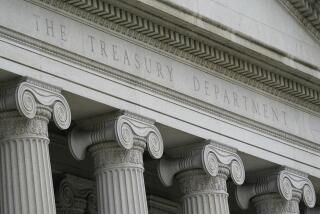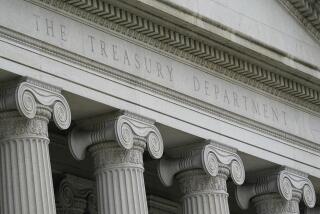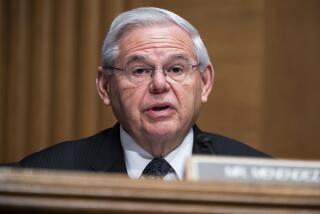Libya to Make Poison Gas Soon, U.S. Says
- Share via
WASHINGTON — Libyan leader Moammar Kadafi’s radical regime, accused of using Iranian-manufactured chemical weapons in its war against Chad last year, is “on the verge” of producing poison gas in its own plants, the Reagan Administration said Wednesday.
State Department spokesman Charles Redman said the recently obtained evidence of Libya’s chemical warfare capability is “a particularly worrisome development in view of the Libyan track record (and) . . . the general record of irresponsible behavior on the part of Kadafi.”
At the same time, Redman said that the Administration opposes legislation, already passed by the Senate, to impose severe economic sanctions on Iraq as punishment for use of chemical weapons against Kurdish insurgents. He said the measure is “premature” and too “sweeping.”
Redman said the Administration is ready to confer with House sponsors of the bill to draft a more limited measure.
“I didn’t say we opposed (all) sanctions,” Redman said. “We think that sweeping sanctions are premature, and we think that we have to look at this question of sanctions and possible use in a way that makes them effective if they’re going to be adopted and in a way that ensures that they lead us toward the objective that we’re looking for.”
California Rep. Tom Lantos (D-San Mateo), chief House backer of the bill by Sen. Claiborne Pell (D-R.I.), said:
“I’m prepared to listen to what their point of view is. Whether their point of view will have merit, I’d have to wait and see. To say that the legislation placing sanctions on Iraq is premature in view of the fact that we have piles of dead human beings, I think, is preposterous.”
Lantos said in a telephone interview that he hopes to obtain House action by the end of next week.
Banning Aid to Iraq
The Senate passed the measure on a unanimous voice vote Friday. The bill would ban American credits or economic aid to Iraq, prohibit the importation of Iraqi oil and require the United States to vote against loans to Iraq by international financial organizations. Supporters of the legislation say that under the weighted voting system employed by international lending agencies, U.S. opposition usually can block a loan. That, in turn, could virtually bankrupt Iraq, which faces a staggering external debt of $60 billion, more than $2,000 for every man, woman and child in the nation.
Redman said the Administration believes that “general, widespread condemnation on the part of the world community” may be enough to deter both Libya and Iraq from further use of chemical weapons.
“I think it is a very effective approach, as has been shown in the past on other issues, that in publicizing what is going on, in calling attention to it, in saying to the world community that there are people out there who are using this horrible weapon--that can have an impact,” he said.
U.S. officials accused Libya of using chemical weapons late last year in its losing military campaign in Chad. According to informed sources, Libya acquired the gas munitions from Iran in exchange for other weapons that Libya had purchased, mostly from the Soviet Union.
Redman conceded that there is no international law against manufacturing chemical weapons. The United States, the Soviet Union and many other nations do so. However, the 1925 Geneva protocol, adopted after the savage gas warfare of World War I, prohibits the use of chemical arms.
Redman said it is impossible to tell where Libya obtained the chemicals needed to make poison gas. The United States refuses to sell such chemicals to nations considered likely to produce chemical weapons. That embargo list already includes Libya, Iran, Iraq and Syria.
However, he said, “the kind of chemicals that are useful in the production of chemical weapons are available on the world market.”
More to Read
Sign up for Essential California
The most important California stories and recommendations in your inbox every morning.
You may occasionally receive promotional content from the Los Angeles Times.













